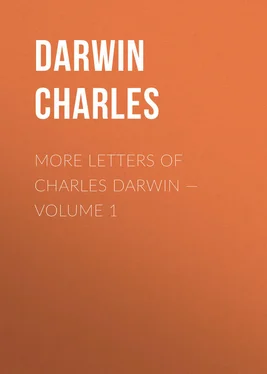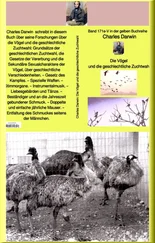Charles Darwin - More Letters of Charles Darwin — Volume 1
Здесь есть возможность читать онлайн «Charles Darwin - More Letters of Charles Darwin — Volume 1» — ознакомительный отрывок электронной книги совершенно бесплатно, а после прочтения отрывка купить полную версию. В некоторых случаях можно слушать аудио, скачать через торрент в формате fb2 и присутствует краткое содержание. Жанр: foreign_antique, foreign_prose, на английском языке. Описание произведения, (предисловие) а так же отзывы посетителей доступны на портале библиотеки ЛибКат.
- Название:More Letters of Charles Darwin — Volume 1
- Автор:
- Жанр:
- Год:неизвестен
- ISBN:нет данных
- Рейтинг книги:4 / 5. Голосов: 1
-
Избранное:Добавить в избранное
- Отзывы:
-
Ваша оценка:
- 80
- 1
- 2
- 3
- 4
- 5
More Letters of Charles Darwin — Volume 1: краткое содержание, описание и аннотация
Предлагаем к чтению аннотацию, описание, краткое содержание или предисловие (зависит от того, что написал сам автор книги «More Letters of Charles Darwin — Volume 1»). Если вы не нашли необходимую информацию о книге — напишите в комментариях, мы постараемся отыскать её.
More Letters of Charles Darwin — Volume 1 — читать онлайн ознакомительный отрывок
Ниже представлен текст книги, разбитый по страницам. Система сохранения места последней прочитанной страницы, позволяет с удобством читать онлайн бесплатно книгу «More Letters of Charles Darwin — Volume 1», без необходимости каждый раз заново искать на чём Вы остановились. Поставьте закладку, и сможете в любой момент перейти на страницу, на которой закончили чтение.
Интервал:
Закладка:
The simplest plan for your end and for the good of entomology, I should think, would be to offer the collection to Dr. J.E. Gray for the British Museum on condition that a perfect set was made out for you. If the collection was at all valuable, I should think he would be very glad to have this done. Whether any third set would be worth making out would depend on the value of the collection. I do not suppose that you expect the insects to be named, for that would be a most serious labour. If you do not approve of this scheme, I should think it very likely that Mr. Waterhouse would think it worth his while to set a series for you, retaining duplicates for himself; but I say this only on a venture. You might trust Mr. Waterhouse implicitly, which I fear, as {illegible} goes, is more than can be said for all entomologists. I presume, if you thought of either scheme, Sir Charles Lyell could easily see the gentlemen and arrange it; but, if not, I could do so when next I come to town, which, however, will not be for three or four weeks.
With respect to giving your children a taste for Natural History, I will venture one remark — viz., that giving them specimens in my opinion would tend to destroy such taste. Youngsters must be themselves collectors to acquire a taste; and if I had a collection of English lepidoptera, I would be systematically most miserly, and not give my boys half a dozen butterflies in the year. Your eldest has the brow of an observer, if there be the least truth in phrenology. We are all better, but we have been of late a poor household.
LETTER 43. TO J.D. HOOKER. Down {1855}.
I should have less scruple in troubling you if I had any confidence what my work would turn out. Sometimes I think it will be good, at other times I really feel as much ashamed of myself as the author of the "Vestiges" ought to be of himself. I know well that your kindness and friendship would make you do a great deal for me, but that is no reason that I should be unreasonable. I cannot and ought not to forget that all your time is employed in work certain to be valuable. It is superfluous in me to say that I enjoy exceedingly writing to you, and that your answers are of the greatest possible service to me. I return with many thanks the proof on Aquilegia (43/1. This seems to refer to the discussion on the genus Aquilegia in Hooker and Thomson's "Flora Indica," 1855, Volume I., Systematic Part, page 44. The authors' conclusion is that "all the European and many of the Siberian forms generally recognised belong to one very variable species." With regard to cirripedes, Mr. Darwin spoke of "certain just perceptible differences which blend together and constitute varieties and not species" ("Life and Letters," I., page 379).): it has interested me much. It is exactly like my barnacles; but for my particular purpose, most unfortunately, both Kolreuter and Gartner have worked chiefly on A. vulgaris and canadensis and atro-purpurea, and these are just the species that you seem not to have studied. N.B. Why do you not let me buy the Indian Flora? You are too magnificent.
Now for a short ride on my chief (at present) hobbyhorse, viz. aberrant genera. What you say under your remarks on Lepidodendron seems just the case that I want, to give some sort of evidence of what we both believe in, viz. how groups came to be anomalous or aberrant; and I think some sort of proof is required, for I do not believe very many naturalists would at all admit our view.
Thank you for the caution on large anomalous genera first catching attention. I do not quite agree with your "grave objection to the whole process," which is "that if you multiply the anomalous species by 100, and divide the normal by the same, you will then reverse the names..." For, to take an example, Ornithorhynchus and Echidna would not be less aberrant if each had a dozen (I do not say 100, because we have no such cases in the animal kingdom) species instead of one. What would really make these two genera less anomalous would be the creation of many genera and sub-families round and radiating from them on all sides. Thus if Australia were destroyed, Didelphys in S. America would be wonderfully anomalous (this is your case with Proteaceae), whereas now there are so many genera and little sub-families of Marsupiata that the group cannot be called aberrant or anomalous. Sagitta (and the earwig) is one of the most anomalous animals in the world, and not a bit the less because there are a dozen species. Now, my point (which, I think is a slightly new point of view) is, if it is extinction which has made the genus anomalous, as a general rule the same causes of extinction would allow the existence of only a few species in such genera. Whenever we meet (which will be on the 23rd {at the} Club) I shall much like to hear whether this strikes you as sound. I feel all the time on the borders of a circle of truism. Of course I could not think of such a request, but you might possibly: — if Bentham does not think the whole subject rubbish, ask him some time to pick out the dozen most anomalous genera in the Leguminosae, or any great order of which there is a monograph by which I could calculate the ordinary percentage of species to genera. I am the more anxious, as the more I enquire, the fewer are the cases in which it can be done. It cannot be done in birds, or, I fear, in mammifers. I doubt much whether in any other class of insects {other than Curculionidae}.
I saw your nice notice of poor Forbes in the "Gardeners' Chronicle," and I see in the "Athenaeum" a notice of meeting on last Saturday of his friends. Of course I shall wish to subscribe as soon as possible to any memorial...
I have just been testing practically what disuse does in reducing parts. I have made {skeletons} of wild and tame duck (oh the smell of well-boiled, high duck!), and I find the tame duck ought, according to scale of wild prototype, to have its two wings 360 grains in weight; but it has only 317, or 43 grains too little, or 1/7 of {its} own two wings too little in weight. This seems rather interesting to me. (43/2. On the conclusions drawn from these researches, see Mr. Platt Ball, "The Effects of Use and Disuse" (Nature Series), 1890, page 55. With regard to his pigeons, Darwin wrote, in November 1855: "I love them to that extent that I cannot bear to kill and skeletonise them.")
P.S. — I do not know whether you will think this worth reading over. I have worked it out since writing my letter, and tabulate the whole.
21 orders with 1 genus, having 7.95 species (or 4.6?).
29 orders with 2 genera, having 15.05 species on an average.
23 orders each with 3 genera, and these genera include on an average 8.2 species.
20 orders each with 4 genera, and these genera include on an average 12.2 species.
27 orders each with above 50 genera (altogether 4716 genera), and these genera on an average have 9.97 species.
From this I conclude, whether there be many or few genera in an order, the number of species in a genus is not much affected; but perhaps when {there is} only one genus in an order it will be affected, and this will depend whether the {genus} Erythroxylon be made a family of.
LETTER 44. TO J.D. HOOKER. Down, April 8th {1856}.
I have been particularly glad to get your splendid eloge of Lindley. His name had been lately passing through my head, and I had hoped that Miers would have proposed him for the Royal medal. I most entirely agree that the Copley (44/1. The late Professor Lindley never attained the honour of the Copley medal. The Royal medal was awarded to him in 1857.) is more appropriate, and I daresay he would not have valued the Royal. From skimming through many botanical books, and from often consulting the "Vegetable Kingdom," I had (ignorant as I am) formed the highest opinion of his claims as a botanist. If Sharpey will stick up strong for him, we should have some chance; but the natural sciences are but feebly represented in the Council. Sir P. Egerton, I daresay, would be strong for him. You know Bell is out. Now, my only doubt is, and I hope that you will consider this, that the natural sciences being weak on the Council, and (I fancy) the most powerful man in the Council, Col. S{abine}, being strong against Lindley, whether we should have any chance of succeeding. It would be so easy to name some eminent man whose name would be well-known to all the physicists. Would Lindley hear of and dislike being proposed for the Copley and not succeeding? Would it not be better on this view to propose him for the Royal? Do think of this. Moreover, if Lindley is not proposed for the Royal, I fear both Royal medals would go {to} physicists; for I, for one, should not like to propose another zoologist, though Hancock would be a very good man, and I fancy there would be a feeling against medals to two botanists. But for whatever Lindley is proposed, I will do my best. We will talk this over here.
Читать дальшеИнтервал:
Закладка:
Похожие книги на «More Letters of Charles Darwin — Volume 1»
Представляем Вашему вниманию похожие книги на «More Letters of Charles Darwin — Volume 1» списком для выбора. Мы отобрали схожую по названию и смыслу литературу в надежде предоставить читателям больше вариантов отыскать новые, интересные, ещё непрочитанные произведения.
Обсуждение, отзывы о книге «More Letters of Charles Darwin — Volume 1» и просто собственные мнения читателей. Оставьте ваши комментарии, напишите, что Вы думаете о произведении, его смысле или главных героях. Укажите что конкретно понравилось, а что нет, и почему Вы так считаете.












